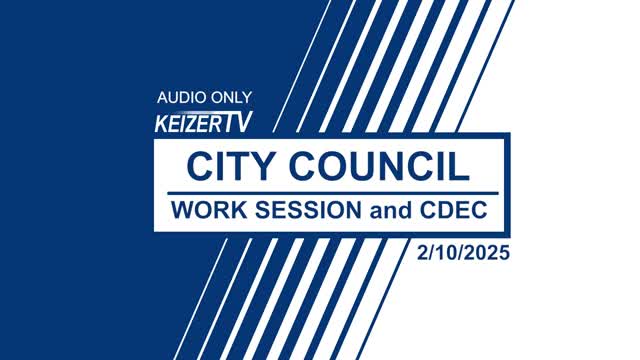Keizer council reviews committee rules, moves to standardize liaison roles and appointment terms
Get AI-powered insights, summaries, and transcripts
Subscribe
Summary
Keizer — Keizer Mayor Clark opened a Feb. 10 work session asking councilors and staff to “review [the] purpose, need, objectives of our boards, committees, and commissions,” and the council then spent the meeting walking through each advisory body’s mission, membership and operating language.
Keizer — Keizer Mayor Clark opened a Feb. 10 work session asking councilors and staff to “review [the] purpose, need, objectives of our boards, committees, and commissions,” and the council then spent the meeting walking through each advisory body’s mission, membership and operating language.
Councilors and city staff emphasized making membership and meeting mechanics consistent across bodies and asked staff to return a revised set of resolutions and website language. City staff described two competing approaches to council appointments: the older model in which volunteers received staggered three‑year terms, and a newer interpretation of council rules that would reset appointments every two years to align with council terms. Council discussion produced majority support for two‑year alignment but not a formal vote: several councilors asked staff to return a resolution drafting that approach for future action.
On liaison status, councilors moved to make several council seats non‑voting liaisons so committees would include more community voting members. Council President Starr and others supported keeping liaison roles non‑voting on panels such as the Volunteer Coordinating Committee and the Public Art Commission; Councilor Kohler noted the change “would make it consistent with the other committees” and would “open up the opportunity for another community member” to serve. Staff will update committee resolutions and the city website to reflect that change.
The council also directed staff to tweak mission text so scheduling details (for example, meeting day/time) appear in operational mechanics rather than in a committee’s mission statement. For the Planning Commission and Traffic Safety/Bike‑Ped Committee the council asked staff to confirm statutory language and to move procedural specifics from mission language into an operational section of the governing documents.
Audit and emergency‑planning items drew detailed discussion. Councilors agreed to remove an outdated reference to an Urban Renewal Agency from the audit‑committee description because Keizer has not had an urban renewal agency for years. On emergency planning, councilors and staff agreed it is appropriate for a councilor to be a voting member of the regional emergency‑planning body because the committee includes multiple public‑safety and county agencies; staff said Marion County is providing grant funding to bring a consultant to update Keizer’s emergency operations plan, which last had a major update in February 2009.
On the audit committee, councilors and committee members discussed practices for vetting and meeting with auditors. Council president Starr suggested changing the committee’s charge from assuring the auditor is “independent and competent” to assuring the auditor is “qualified,” and councilors directed staff to build in a practice of meeting with the city’s auditors in advance of the audit so members can highlight areas of concern.
Traffic Safety/Bike‑Ped committee members and councilors flagged outdated references in Appendix A (committee duties) and asked the committee to review the appendix and return a recommendation. Council members also asked for consistent language across all committee descriptions about whether bodies advise the “City Council” or both the council and city staff; staff will harmonize statutory requirements where they differ (for example, planning commission quasi‑judicial duties).
Next steps: staff was directed to assemble a consolidated, revised package of committee resolutions and website edits for council review. Councilors also asked staff to return options on the Community Diversity Engagement Committee’s membership and youth appointment (the item was parked for further conversation with CDEC members). No formal votes were taken at the work session; councilors instead gave staff direction and asked for revised materials to return for action at a future meeting.
Quotes from the meeting illustrate the tone of the session. Mayor Clark opened the session by saying the council would “review purpose, need, objectives of our boards, committees, and commissions.” Councilor Kohler said changing a council seat to “non voting liaison” would “make it consistent with the other committees” and would “open up the opportunity for another community member to be on the committee.” Staff and councilors agreed the audit committee should “assure that the auditor selected is both...qualified,” a wording change the council supported.
The council set a follow‑up timeline: staff will draft consolidated changes and bring them back for formal action; the council suggested scheduling another joint update with the Community Diversity Engagement Committee in mid‑year to monitor implementation.
Ending note: the work session closed with direction to move technical meeting details (days/times) out of mission text and into operational mechanics, and to return a single clean resolution package so the council can adopt uniform, current language across all advisory‑body descriptions.
